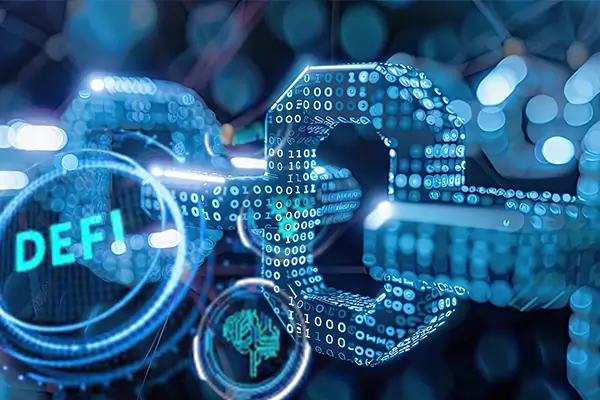Blockchain technology is a game-changing force in the digital world with its ability to transform not only how data is stored but also how industries themselves function. Decentralized finance (DeFi) is one of the most promising spaces blockchain is having an impact on. DeFi utilizes blockchain to create a new system of finance that functions without traditional intermediaries such as banks or financial institutions. Rather, blockchain creates the framework through which open, secure, and efficient financial systems can be built and are available to anyone with access to the internet.
What is Decentralized finance (DeFi)?
Decentralized finance or DeFi refers to a move away from the older conventional financial model towards decentralized financial solutions enabled by decentralized technologies, primarily on the Ethereum blockchain. The sector has a vast array of financial instruments ranging from lending and borrowing platforms, stablecoins, and tokenized assets like Bitcoin, among many others, creating an incredibly vast network of protocols. Because well over $13 billion is locked up in Ethereum blockchain smart contracts, DeFi is the gold medalist in growth for the blockchain as a platform with immense potential for developers, users, and institutions.
In contrast to the conventional finance that is centralized on authorities, DeFi operates on code over Ethereum's decentralized network. Based on immutable smart contracts, DeFi protocols autonomously operate and are accessible by all internet-connected users. The new model makes possible revolutionary use cases like decentralized exchanges, synthetic assets, and flash loans, unique to blockchain, achieving novel advantages around risk, trust, and economic possibility.
The Use of Blockchain and Smart Contracts in Decentralized Finance (DeFi)
Blockchain forms the foundation for DeFi applications since it is a distributed ledger that protects transactions within a network of nodes or computers. Decentralized architecture eliminates intermediaries like banks that have been traditionally employed to facilitate and manage transactions. One of the most significant aspects of blockchain is its immutability that is once a transaction is committed, cannot be altered or edited. This provides permanent, irreversible records, with the added security and trust factor. As the blockchain is decentralized, one cannot have control over the system, so it becomes more secure. Additionally, the cryptography methods applied to protect data and transactions also assist in providing a second level of protection, protecting user information as well as funds.
DeFi is based on the decentralization of blockchain technology to enable P2P payments such that immediate transactions can be directly executed between parties without any intervention of a trusted third party. It is cost-effective and enables financial inclusion, particularly for those without access to bank facilities. Smart contracts, the enforceable agreements coded within blockchains, are central to the automatic enforcement of financial transactions in DeFi. Autonomous enforcement of conditions stated smart contracts eliminate middlemen to bring efficiency, transparency, and security to decentralized systems such as lending protocols and decentralized exchanges.
Major Decentralized Finance (DeFi) Principles on Ethereum
DeFi is built on core pillars of the Ethereum blockchain to enhance financial security, transparency, and opportunities for growth.
Programmability enables smart contracts to make transactions and create new financial instruments and digital tokens. Immutability ensures that tamper-proof coordination among information on Ethereum's decentralized network is secure and audit-proof. Interoperability enables DeFi protocols to stack neatly on top of one another, so that developers can build upon a platform and make the most of interfaces. Transparency is also critical because every public chain transaction is authenticated by the users, providing high-quality analysis of the data and accountability. Permissionless access provides permission to access DeFi apps to any person who has an internet connection and a crypto wallet. Lastly, self-custody also provides users with the ability to control assets directly via Web3 wallets.
DeFi Innovations: Primary Protocols and Mechanisms
Yield Farming & Liquidity Mining: The users can lock their assets in liquidity pools and receive rewards in tokens that are not their own, receiving return on investment and funding protocol building and governance.
Flash Loans: Clients can borrow collateral-free assets if they are paid back in a single block of trades, thereby facilitating sophisticated trades like arbitrage and cross-collateral swaps across DeFi.
Composability: DeFi protocols can communicate with each other seamlessly, giving the promise to build sophisticated and efficient financial constructs across platforms.
Conclusion
Decentralized Finance (DeFi) is a major change in the world of finance, making use of blockchain technology to remove the middlemen and create more accessible, secure, and transparent financial services. With the use of smart contracts, DeFi protocols run independently, providing new financial products such as decentralized exchanges, yield farming, and flash loans. With its emphasis on decentralization, immutability, and programmability, DeFi has the potential to redefine traditional finance, offering the prospect of financial inclusion and efficiency. As the industry continues to grow, the possibility of decentralized financial systems democratizing access to capital and spurring innovation remains huge.
References:
https://www.investopedia.com/decentralized-finance-defi-5113835
.webp)










.webp)































.webp)
